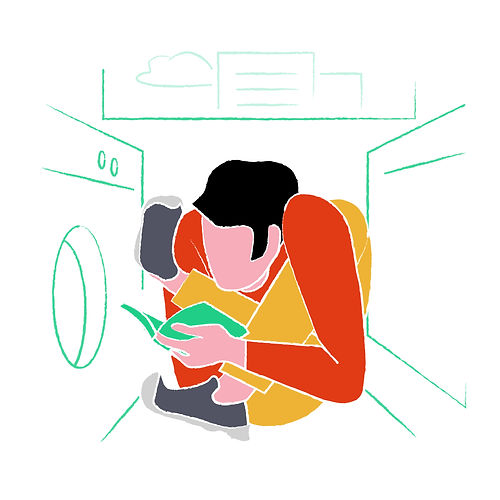
You are not alone!
This website, originally developed during the first Covid lockdowns, is designed to help you take care of your mental health during your higher education studies. You'll find two main pages:
1 — One section provides a census of all the free, available psychological support accessible across the 30 académies in France, as well as a list of support services specifically accessible to students working in the health sector.
2 — Another section which contains advice for maintaining your psychological well being : links to informative resources and tips to help you start feeling better right away.
Why this website?
People may have said that it'd be a story to tell the grandkids—but being a student in the middle of a global pandemic really wasn't easy. (In fact, it still isn't.) Everything was disrupted:
-
our home environment: cooped up in a (very…) small studio, in a flat share, in university halls of residence or with relatives around whom we're not necessarily super comfortable, it was a tough time.
-
our studies: Zoom, Jitsi, Google Meet, Slack, Teams... so many of these monosyllabic apps which were often synonymous with confusion, repetition, crashes, and endless buffering. Plus, seeing our friends and teachers as 2D entities on a screen could feel quite alienating.
We can all agree that it wasn't easy. That’s why we gathered some resources and advice for students at the time, and we've been keeping them up to date since. Whether you would just like a distraction now, or are after some more in depth support, you might find some useful content on this website. Take a look below.

How did the lockdowns affect student mental health?
During the lockdowns, you were mentioned a lot, dear Student. But what do we really know about your mental health during that period. Below, we've collected some of the main surveys and studies that were carried out on the topic of student mental health during the lockdown. What do you think—are you surprised or are those the figures you were expecting? Feel free to share your opinion on Nightline France's Instagram page.
-
Young people face a crisis: it’s urgent that we act ! - FAGE / ISPOS (2020)
-
Lockdown Survey - iShare (2020)
If you’d like your experience to be included, don’t hesitate to take a glance at this survey where you can get involved.
And to find out more about mental health issues in general, see Psycom’s map "Who’s saying what about this issue online".
And what if I want to help?
Being there for others, whoever they may be—regardless of whether or not there's an ongoing health crisis—can take many forms. Here are some initiatives that might inspire you.
If you are interested in mental health peer support initiatives, why not see if you can become a Health Relay Student at your university? In addition, Nightline France is always delighted to receive your application to be an English-speaking listening volunteer if you're a student in Paris (or a French-speaking listening volunteer in Paris, Saclay, Lyon, Lille, Toulouse, Amiens and Angers). See more information here about volunteering for Nightline.
If you want to help in the context of the current crisis, take a look at this platform which includes local solidarity initiatives and this platform set up by 3 friends. Finally, the government's "Je Veux Aider" website lists local citizen missions open to volunteers.

Why this approach?
According to a study conducted by the Observatoire de Vie Étudiante (Student Life Observatory) involving more than 45,000 students, 31% of them showed signs of psychological distress during the first lockdown [1]. In addition, 11.7% of students had suicidal thoughts, compared to 7.6% in the general population [2], and the harmful effects of this period on mental health will last: according to the Australian Medical Association, the number of suicides is likely to increase by about 30% among young people in the next few years [3].
To address this issue, we have gathered in this website a set of tips and solutions to maintain your mental health.
Sources
[1] OVE, 2020
[2] iShare, 2020
[3] Avis de l'Association Médicale Australienne, 2020
